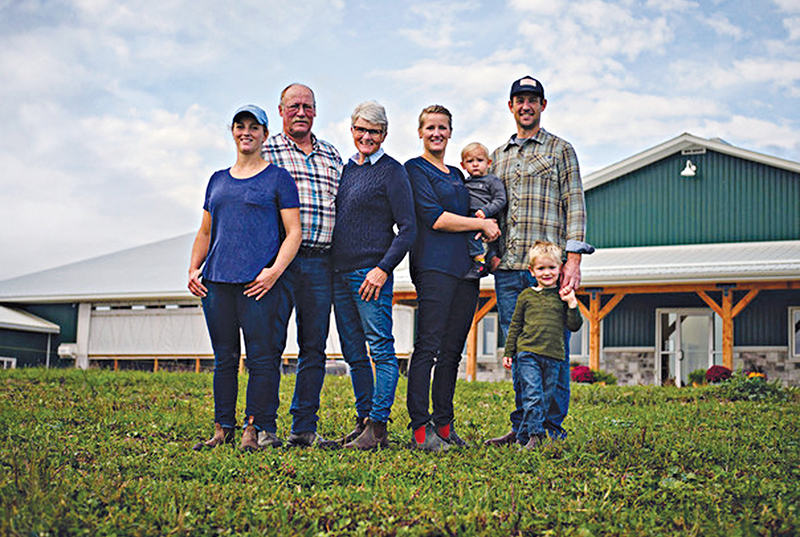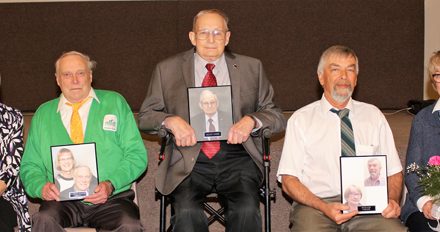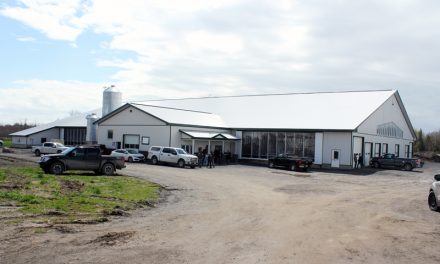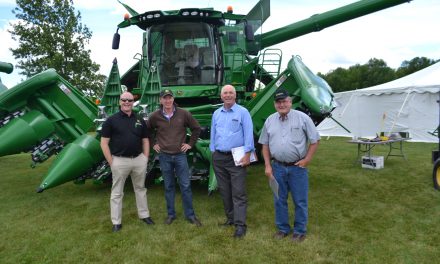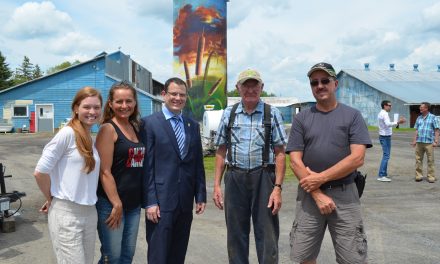The den Haan & Edwards family stand in front of their robotic dairy barn; the beginning of the production journey for their A2 milk. From left to right: Emily den Haan, John den Haan, Bonnie den Haan, Marianne Edward, Mike Edward, Wyatt Edward, and Walter Edward. Courtesy Photo
By Vanessa White
AgriNews Contributor
Over the past year there has been an increase in the number of people working from their homes. It is a challenge to manage work and family, set priorities and to try to work without distractions.
For farmers, this scenario is nothing new. Marianne Edwards is an entrepreneurial and articulate mother of three young boys who, along with her husband Mike, manage Sheldon Creek Dairy in Loretto, Ontario.
The dairy operates on the same property as Haanview Holsteins, which her parents, Jon and Bonnie den Haan, have farmed together for 40 years. It is a true family enterprise with Jon and daughter, Emily, managing the farm, while Bonnie works in both the barn and dairy (as well as sitting on the board of Dairy Farmers of Ontario and Dairy Farmers of Canada). Edwards highlighted some of the challenges and successes they have had in running a family business as well as explaining about their unique product: A2 milk.
Sheldon Creek Dairy’s website states that “by definition A2 is cows’ milk that contains only the A2 type of beta-casein protein rather than the more common A1 protein found in a majority of milk.” This is exciting news for people that have difficulties tolerating cows milk because the A2 protein is often found to be easier to digest than A1 protein. Humans, goats, and buffalo produce A2 milk; therefore, individuals who are able to drink goats’ milk can often digest A2 cows’ milk with no issue.
Edwards summed it up by saying, “The most exciting part of the whole business for us as dairy farmers and processors, is that we are able to put out a product for people who haven’t been able to drink milk and have had to go to the alternative beverage section and drink almond, soy and oat beverage. They are able to drink real milk again. Milk is all natural and something that cannot be made in a laboratory.”
Edwards also recounted many reviews from grateful customers that are finally able to enjoy a latte or a bowl of cereal after years of not being able to consume dairy products.
It all started in 2012 when Edwards’ sister, Emily, was spending the summer in Australia. She noticed a variety of dairy products that she had not seen on Canadian shelves. Several of these products, specifically A2 milk and the flavoured creamers, piqued her interest and started her on a journey of turning their family dairy farm into a multigenerational business.
In 2019, the family started work on a new robotic dairy barn with the intent of having two streams of milk, one from the cows that had the genes to produce the A2 and the other from the cows that had the A1 gene (conventional milk).
It would be one of the first farms in Canada to produce a 100 per cent pure line of milk from A2/A2 cows. They worked with Lely to construct a dual robot system that diverts the milk into separate milk lines and bulk tanks. “We treat the milk from the A2 cows much like a severe peanut allergy, and the milk from the A2 cows doesn’t come into contact with milk from cows that produce A1 protein,” said Edwards. The dairy also processes the milk on separate days so there is no risk of cross-contamination.
Sheldon Creek Dairy now produces a full line of products including A2 milk, flavoured creamers, yogurt, and kefir. Products are sold from the on-farm store to local retailers and also through their website, www.fromthefarmer.ca which offers the old-fashioned luxury of home delivery. The business has been so successful that they have started work on an expansion four times the size of their existing facility.
Speaking of challenges, Edwards mentions that many sufferers of dairy and lactose intolerance are hesitant to try a new product and much of the marketing hours and budget is spent educating the public on A2 milk. She also stresses that running a dairy will probably not be a part-time or retirement plan for most. Just as many hours are spent in the dairy as on the farm and making the switch from farming to customer service, product development and marketing was quite challenging. Employees for each enterprise are kept separate. For example, you cannot go from farm to dairy without a shower and complete change of clothes because of the risk of contamination. Bonnie, who is the only family member that works in both the barn and dairy, laughingly mentioned that she had showered and changed 5 times already that day… and it was still morning.
Many family farms find succession planning and role definition a test of their relationship. The success of Sheldon Creek Dairy and Haanview Holsteins is in part due to the family taking a proactive approach to the issue by having well defined roles for each family member and monthly business meetings that are held off-farm. Bonnie and Jon have intentionally given their children ownership over portions of the business and allowed them the space to make mistakes and grow. They also did personality tests for each family member to help each other understand how the others think and deal with stress. Talking about family businesses, Marianne advises, “If you want to have a successful business, start talking about succession planning now. I remember our very first succession-planning meeting. We all had to put our names in the middle of the table, and we had to draw a name. We had to think as if that person just died and how would the business continue to run if that person was not there. It sounds morbid, but it is really important to know.”
Many dairy farmers are trying to come up with ways to expand their farms to allow for several generations to work side by side. Sheldon Creek Dairy is a great example of how one family has capitalized on the strengths of each of their members in order to run a successful agri-business.

